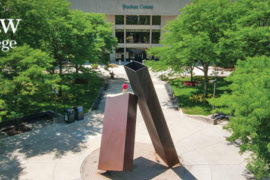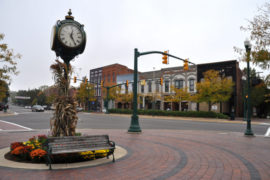Owen Carlson walked into Dexter High School as a student for the first time just a few months ago but the freshman had a little bounce in his step and some confidence in his back pocket. He already had found a club he was familiar with and excited to be a part of because, well, we will let him explain.
“I’m starting my third year of doing debate and I have already seen benefits from doing it,” said Carlson, who joined the Mill Creek Debate Team in seventh grade. “I’m a better public speaker, I am better at writing, and it is easier for me to find evidence for English papers and be able to back that evidence up. I definitely believe that being a part of this team will help me in the future. I would like to be an elected official later in life and doing debate will help with that career path.”
The Dexter Debate Team began in 1994 when Debora Marsh was first hired by Dexter schools. Marsh is currently the IB/AP Coordinator, English Department Chair and Director of Debate and Forensics. The Dexter team currently is made up of 30 students (many of them will continue to participate in speech by being part of the Forensics Team during the second semester).

“We have middle schoolers and high schoolers together on our team, though at the state level, the Middle School kids are considered Mill Creek students,” Marsh said. “Last year, our middle school team won the MIFA state championship at the Middle Level, while our novice (first-year students), and varsity teams were semifinalists at their respective levels.”
The team are members of the National Speech and Debate Association, the Michigan Interscholastic Forensic Association, and Michigan Speech Coaches, Inc. All of these organizations run statewide (or national) tournaments. Dexter attends invitational tournaments throughout the season including many here in Michigan (Birmingham, Saline, Holt, etc.). Some of the top students will travel to other tournaments including ones in Evanston, IL; Lexington, KY; Omaha, NE; and Dallas.
The University of Michigan hosts a tournament every year which is a Tournament of Champions Bid tournament. Teams of two students need to reach elimination rounds at “national tournaments” to receive a bid. Although the U-M tournament is in Michigan, it is a “national tournament” because it draws schools from all over the country.
“Last year two of my juniors (MacKenzie Gabriel-Lazette and Rose Reilly) made it to the semifinal round, winning them a bid to the national Tournament of Champions in Lexington,” Marsh said. “Additionally, as an NSDA member, our students participated in the National Qualifier which was held at Wayne State University last spring, and two of my seniors (Joe Lynch and Zane Aridi), qualified for the NSDA National Championship which was held in Dallas last June.”

The Dexter team has been very successful over the years and is considered one of the elite programs in the state. In fact, there is even a travel trophy named after Marsh.
“I’ve coached debate in Michigan very successfully since 1983, so basically forever, and I have been the chair of the MIFA Debate Committee for I don’t know how many years,” she said. “The MIFA initiated (the award) at last year’s state championship. It is for the school whose combined success at Novice and Varsity levels is the best in the state. We missed last year by three points – it is my goal to have the team win that trophy before I retire.”
The teams participate in Public Forum Debate, which is a two vs. two style of debate. Students speak at normal rates of speed and either support or negate the resolution. Resolutions change throughout the year, there is a Sept/Oct topic, a Nov/Dec topic, and then each month, starting in January, the topic changes through April with a new topic for Nationals in June.
The current resolution is: Resolved that the European Union should join the Belt and Road Initiative. The Nov/Dec topic will be on Cybersecurity.
Marsh believes that debate is the “very best activity a student can do while in school” because it teaches research skills, argumentation skills, communication skills, collaboration skills, and opens up the world to the students.
“The topics are timely and global, so debaters actually know about the world (probably more than a lot of adults who rely on FB and Twitter for their news),” she says. “Debate makes students smarter, gives them confidence, and allows them to think for themselves. Debaters must look at both sides of the resolution, and in this style of debate, they don’t know which side they will have to debate until the coin is tossed at the beginning of each round, so they must be completely prepared and persuasive on both sides of every issue. Every student can benefit from being part of a debate program.”

One of those students is Carlson, who first became interested in Debate when his brother joined the team and debated for two years.
“I enjoy the people that I get to meet and work with,” Carlson says. “Being able to work with these people and having that support really helps the team and individual success.
“I think that Dexter has been so successful because of the team helping people succeed. We all work with each other reviewing each other’s cases and try to be as prepared as possible before each tournament. We have practice debates before every tournament and we always look at what our opponents have said and try to come up with counter arguments to block them.”
Carlson and his partner won the Novice Division at the recent West Bloomfield Tournament. “It was a fun time and one of the highlights for me so far,” he said.











